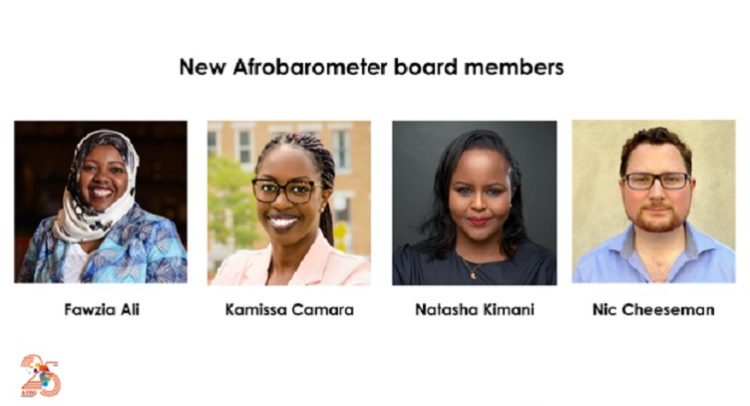Afrobarometer has announced the appointment of four new members to its Board to strengthen its efforts to intensify the voices of African citizens through reliable data and insightful analysis.
A statement issued in Accra on Friday July 26, 2024 said the new board members, were inducted during Afrobarometer’s 25th Anniversary celebration in Accra.
The four new board members are Fawzia Ali, Chief Consumer Business Officer at Safaricom, a leading telecommunications company in Kenya, Kamissa Camara, professor of practice in international diplomacy at the Gerald R. Ford School of Public Policy, University of Michigan,
The rest are Natasha Kimani, an advocate of the Kenyan High Court with more than 15 years of experience in gender mainstreaming, social justice research and activism, gender based violence prevention and response, and Nic Cheeseman, professor of democracy at the University of Birmingham and former director of the African Studies Centre at the University of Oxford.
The statement said Fawzia Ali’s career spans finance, marketing, sales, customer experience, product development among others while Kamissa Camara, a senior Africa advisor at the United States Institute of Peace and a non-resident scholar at the Middle East Institute, has held strategic positions in the Malian government, including Minister of Foreign Affairs, Chief of Staff to the President, and Minister of Digital Economy and Planning.
It said Natasha Kimani has also been instrumental in drafting gender-responsive policies and legislation in Kenya and also worked with prominent organisations and institutions, including the Kenya Law Reform Commission.
The statement said Nic Cheeseman is an academic whose research focuses on democracy, elections, and development, and has also authored and edited more than 10 books.
Afrobarometer Board Chair, Emmanuel Gyimah-Boadi, said the new members will significantly reinforce the organisation’s strengths in terms of “diversity, technical expertise, and regional representation,” and also help carry its vision forward to the next generation as young leaders who are highly accomplished in their respective fields.
By Ebenezer K. Amponsah


